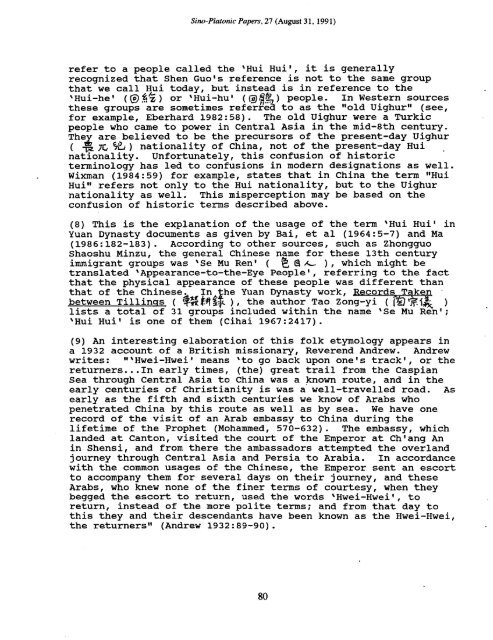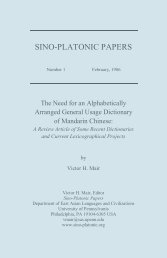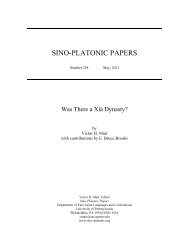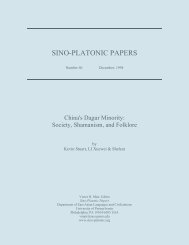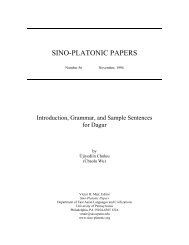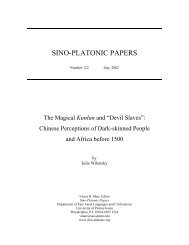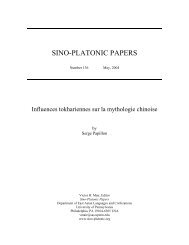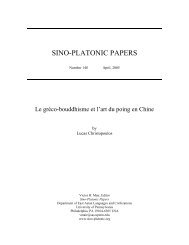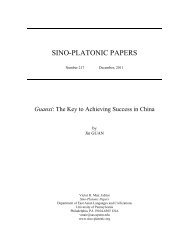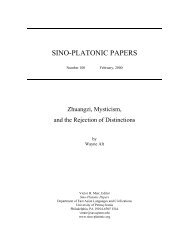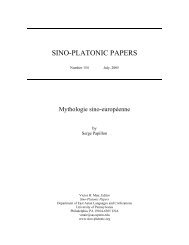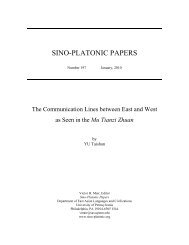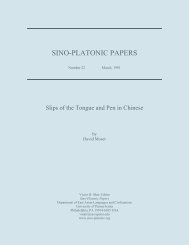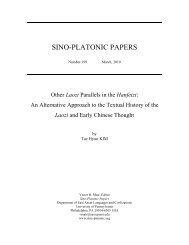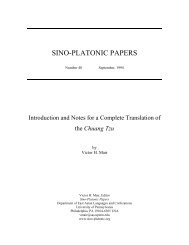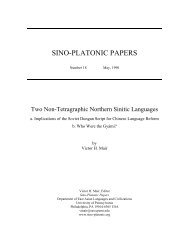Essays on Writing and Language in Honor - Sino-Platonic Papers
Essays on Writing and Language in Honor - Sino-Platonic Papers
Essays on Writing and Language in Honor - Sino-Platonic Papers
Create successful ePaper yourself
Turn your PDF publications into a flip-book with our unique Google optimized e-Paper software.
S<strong>in</strong>o-Plat<strong>on</strong>ic <strong>Papers</strong>, 27 (August 3 1, 199 1)<br />
refer to a people called the 'Hui Huil, it is generally<br />
recognized that Shen Guo's reference is not to the same group<br />
that we call Hui today, but <strong>in</strong>stead is <strong>in</strong> reference to the<br />
'~ui-hel ( @ 3% ) or 'Hui-hul ( @I$$ ) people. In Western sources<br />
these groups are sometimes referred to as the Itold Uighur1I (see,<br />
for example, Eberhard 1982:58). The old Uighur were a Turkic<br />
people who came to power <strong>in</strong> Central Asia <strong>in</strong> the mid-8th century.<br />
They are believed to be the precursors of the present-day Uighur<br />
( Ex vd) nati<strong>on</strong>ality of Ch<strong>in</strong>a, not of the present-day Hui<br />
nati<strong>on</strong>ality. Unfortunately, this c<strong>on</strong>fusi<strong>on</strong> of historic<br />
term<strong>in</strong>ology has led to c<strong>on</strong>fusi<strong>on</strong>s <strong>in</strong> modern designati<strong>on</strong>s as well.<br />
Wixman (1984:59) for example, states that <strong>in</strong> Ch<strong>in</strong>a the term "Hui<br />
HuiI1 refers not <strong>on</strong>ly to the Hui nati<strong>on</strong>ality, but to the Uighur<br />
nati<strong>on</strong>ality as well. This mispercepti<strong>on</strong> may be based <strong>on</strong> the<br />
c<strong>on</strong>fusi<strong>on</strong> of historic terms described above.<br />
(8) This is the explanati<strong>on</strong> of the usage of the term 'Hui Huil <strong>in</strong><br />
Yuan Dynasty documents as given by Bai, et a1 (1964:5-7) <strong>and</strong> Ma<br />
(1986:182-183). Accord<strong>in</strong>g to other sources, such as Zh<strong>on</strong>gguo<br />
Shaoshu M<strong>in</strong>zu, the general Ch<strong>in</strong>ese name for these 13th century<br />
immigrant groups was \Se Mu Ren I ( $ a L ) , which might be<br />
translated 'Appearance-to-the-Eye People1, referr<strong>in</strong>g to the fact<br />
that the physical appearance of these people was different than<br />
that of the Ch<strong>in</strong>ese. In he Yuan Dynasty work,<br />
between Till<strong>in</strong>ss ( $$&kt($$. ), the author Tao<br />
lists a total of 31 groups <strong>in</strong>cluded with<strong>in</strong> the name 'Se Mu Renl;<br />
'Hui Huil is <strong>on</strong>e of them (Cihai 1967:2417).<br />
(9) An <strong>in</strong>terest<strong>in</strong>g elaborati<strong>on</strong> of this folk etymology appears <strong>in</strong><br />
a 1932 account of a British missi<strong>on</strong>ary, Reverend Andrew. Andrew<br />
writes: "'Hwei-Hweil means 'to go back up<strong>on</strong> <strong>on</strong>els track1, or the<br />
returners-..In early times, (the) great trail from the Caspian<br />
Sea through Central Asia to Ch<strong>in</strong>a was a known route, <strong>and</strong> <strong>in</strong> the<br />
early centuries of Christianity is was a well-travelled road. As<br />
early as the fifth <strong>and</strong> sixth centuries we know of Arabs who<br />
penetrated Ch<strong>in</strong>a by this route as well as by sea. We have <strong>on</strong>e<br />
record of the visit of an Arab embassy to Ch<strong>in</strong>a dur<strong>in</strong>g the<br />
lifetime of the Prophet (Mohammed, 570-632). The embassy, which<br />
l<strong>and</strong>ed at Cant<strong>on</strong>, visited the court of the Emperor at Chlang An<br />
<strong>in</strong> Shensi, <strong>and</strong> from there the ambassadors attempted the overl<strong>and</strong><br />
journey through Central Asia <strong>and</strong> Persia to Arabia. In accordance<br />
with the comm<strong>on</strong> usages of the Ch<strong>in</strong>ese, the Emperor sent an escort<br />
to accompany them for several days <strong>on</strong> their journey, <strong>and</strong> these<br />
Arabs, who knew n<strong>on</strong>e of the f<strong>in</strong>er terms of courtesy, when they<br />
begged the escort to return, used the words 'Hwei-Hweif, to<br />
return, <strong>in</strong>stead of the more polite terms; <strong>and</strong> from that day to<br />
this they <strong>and</strong> their descendants have been known as the Hwei-Hwei,<br />
the returners" (Andrew 1932 : 89-90) .


